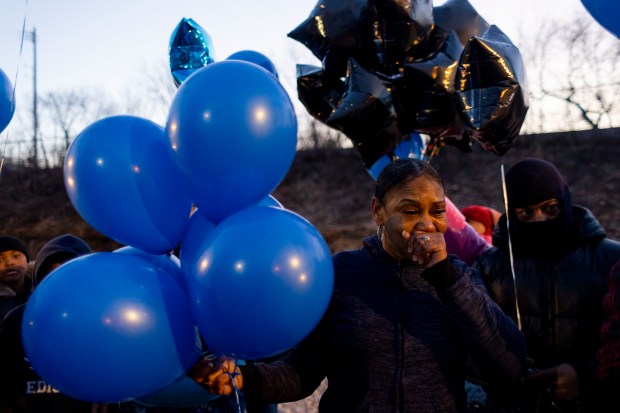Eleven-year-old Jayden Perkins died trying to protect his mom allegedly from a rampaging ex-boyfriend who should have been in jail rather than terrorizing Jayden’s family in their Edgewater home.
There’s much we still don’t know about all that went wrong in the case of Crosetti Brand, now charged with first-degree murder and other offenses in the killing of Jayden and the stabbing of the boy’s 33-year-old pregnant mother, who thankfully survived. But we know enough to conclude that the system badly failed this family.
Brand, 37, was paroled in late October, having served eight years of a 16-year sentence. A few months later, on Jan. 30, he texted the victim in this case, threatening to kill her and her family, according to prosecutors. Two days later, on Feb. 1, he tried to get into her apartment, prosecutors said. She called police, and they didn’t allow her to file a police report, she said later in court. Instead, she said, they told her to go to the Cook County Domestic Courthouse to get an order of protection.
That’s what she did on Feb. 22. Meanwhile, in early February, Brand was sent back to jail, apparently for suspicion of violating the terms of his parole when he allegedly threatened her and tried to get into her home Feb. 1. The judge, Thomas Nowinski, opted not to grant her the emergency order of protection; the reason he gave was that there was no emergency since Brand was in jail.
The judge made no effort, it appears from the transcript of the brief proceeding in which she made her case to him, to determine how long Brand would be confined or why he was there. He postponed the matter until March 13.
Brand was released March 12. Why? The Illinois Prisoner Review Board told the Chicago Sun-Times that it determined it couldn’t continue to detain Brand due to a failure to meet the necessary “preponderance of the evidence” standard. The next day — the day the judge was to reconsider her request for an emergency order of protection — Brand allegedly ambushed the mother and her two sons, ages 11 and 5, in their home, killing the 11-year-old and badly wounding his mother. The 5-year-old wasn’t physically harmed but witnessed the attack.
At the news conference last week announcing the charges against Brand, Chicago police Superintendent Larry Snelling was unequivocal. “This is someone who should not have been on the street,” he said. He wondered aloud about why Brand was released once he was imprisoned in February following what appeared to be egregious parole violations.
We agree. Common sense would tell you that an offender out on parole should be sent back to prison for the remainder of his term if he reengages in the behavior that got him put behind bars in the first place. In Brand’s case, prosecutors said he threatened and then attempted to enter the home of Jayden’s mother who, like the victim in the case that sent him to jail, had received a past order of protection applying to him.
So what went wrong here? It appears nearly everything.
The cops in the initial instance didn’t provide a police report, as the victim requested. That could have helped support Brand’s detention for violating parole. Snelling wasn’t asked about that at the news conference and so didn’t explain whether that first instance of the victim’s dealings with the system following Brand’s October release was appropriately handled.
We don’t know enough yet about the Prisoner Review Board’s proceeding to understand why what is so obvious now wasn’t back then.
But it appears the judge didn’t do enough to comprehend the gravity of the situation and made a snap decision based on the facts on the ground, which were that Brand wasn’t at large at that instant.
We spoke with Amanda Pyron, executive director of The Network: Advocating Against Domestic Violence, and she told us she didn’t see a simple legislative fix that would have prevented what happened here. In effect, she told us, the entire system set up to protect families threatened in this way failed.
At no point, it appears, was the victim given information about the resources available to her, including the potential for relocating her family quickly, Pyron said.
We agree with Pyron when she told us, “I think we have a lot of gaps in our systems. … (This case) is not unique in its preventability.”
We also agree with Chicago’s frustrated top cop, Snelling, when he said, “We cannot wait until tragedy happens to decide we’re going to do something about it.”
Domestic abuse and violence appear to be on the rise. The Nework’s domestic violence hotline, operated on behalf of the state, received close to 47,000 calls last year, up from roughly 25,000 in 2018, according to Pyron. Chicago calls went up 26% from 2022 to 2023 with Cook County rising 24% over the same period.
Chicagoans’ worries about their safety in public have been well documented. There’s been far less attention paid to the similar fears felt by too many inside their own homes.
The lapses that led to this horrific — and, yes, preventable — tragedy must be fully investigated and publicly shared. And then those tasked with the critical work of doing everything possible to protect women caught in these nightmares must make the necessary changes to close the systemic gaps that took Jayden Perkins from this city and his family.
If you or a loved one are suffering from domestic abuse, you can get help by calling the Illinois Domestic Violence Hotline at 877-863-6338.
Submit a letter, of no more than 400 words, to the editor here or email letters@chicagotribune.com.



